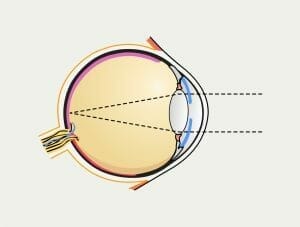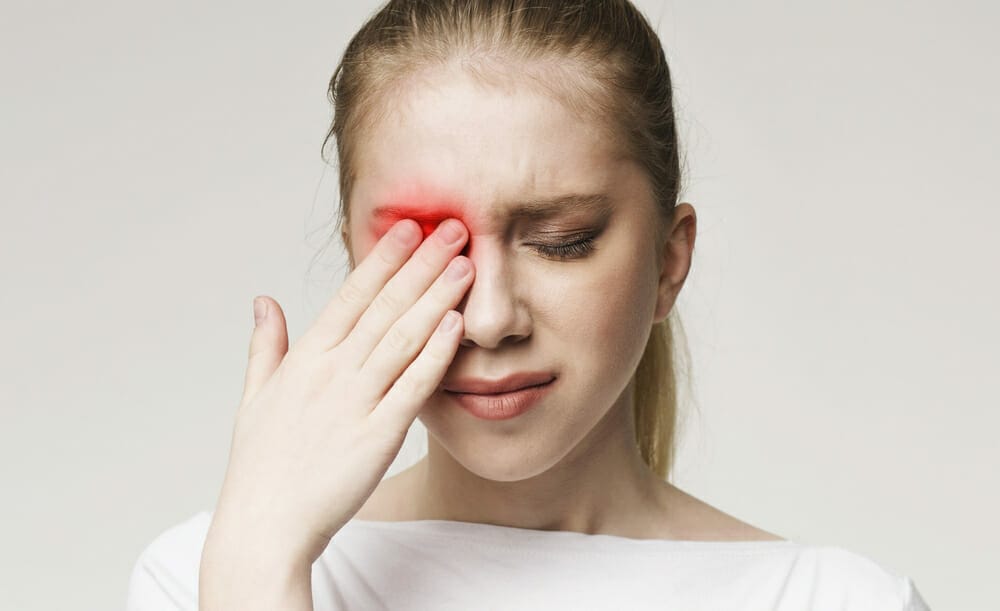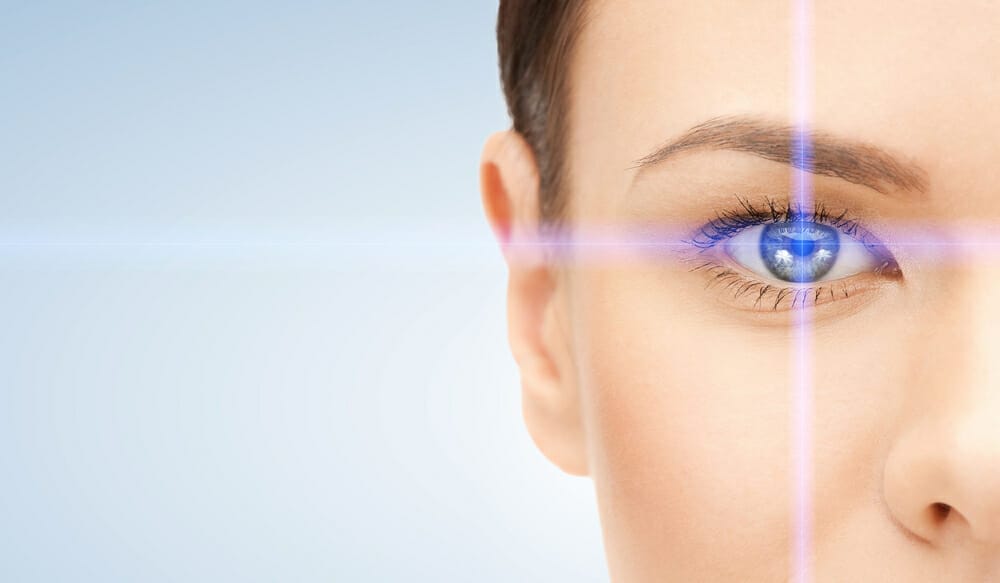Tired eyes are a common ailment that largely affects young and middle-aged, active working and studying people. The problem with correct vision along with accompanying symptoms, including annoying headaches and dry eyes, is largely rooted in lifestyle. The visual apparatus continues to be heavily exploited, if only by staring at screens and displays of electronic devices for hours on end. However, this is only one of the causes of eye strain and problems with clear vision. How to take care of your eyesight?
Table of contents
- 1 Tired eyesight, blurred vision – an increasingly common phenomenon among young and old alike
- 2 Tired eyes – causes
- 3 Burning, itching, pain – the most common symptoms of tired eyes
- 4 Eye fatigue and dry eye syndrome
- 5 How to prevent vision fatigue, or invaluable prevention
- 6 Simple home remedies for tired eyes – how to relieve symptoms in no time?
- 7 What to do when your eyes are tired – the best ingredients for good eyesight used in drops and dietary supplements
- 8 Sight fatigue, burning, redness, tearing – when to go to the eye doctor?
Tired eyesight, blurred vision – an increasingly common phenomenon among young and old alike
The eye is one of the most specialized and elaborate, as well as the most sensitive structures in the human body. It is also an organ forced to work intensively for most of our lives. It starts working every day with waking up and opening our eyelids for the first time, and finishes just before falling asleep.
It’s no wonder, then, that our visual apparatus often becomes overstressed and overtired, even more so if we indulge in activities that require our eyes to work constantly under difficult conditions (e.g. in unfavorable lighting) or frequent focusing of the eyes on a single point.
Many factors, most often related to daily habits and the work we do, affect the condition of the visual apparatus. Very often this problem occurs in people who spend a lot of time in front of screens and displays of electronic devices. Hence the high percentage of young people complaining about this ailment. Also, the phenomenon of tired eyesight, sore eyes and problems with vision is increasingly observed in children. How does the effect of tired eyes occur?

The eye is a complex structure including: The eyeball (including the lens, cornea, iris and retina), the optic nerve (which conducts visual stimuli), the muscles of the externalof the eyeball (responsible for the eye’s motor abilities) and the protective apparatus of the eye (in the form of eyelids, eyelashes, conjunctiva and the lacrimal gland that produces tears). The correct operation of the eye is supervised by the visual center located in the cerebral cortex.
The function of the protective apparatus of the eye is to protect it from negative external influences. While the eyelids primarily protect the eye from trauma and too much light, the tears secreted by the lacrimal gland mainly protect the eye from microorganisms, dust, dirt, dust and infections.
As already mentioned, the lacrimal gland is responsible for producing tears. They are secreted continuously and form a so-called tear film on the surface of the eyeball. The tear film acts as a specific moisturizer of the eyeball, and at the same time provides the cornea with nutrients and participates in the cleansing process of the visual apparatus.
Exposing the eyes to strong negative influences or strongly straining the eyes for a long time, the production of tears can be disrupted. The tear film is then disrupted, which in turn results in excessive dryness of the eye, increasing its susceptibility to irritation and inflammation, blurred vision and a feeling of discomfort and visual fatigue.
Tired eyes – causes

In the age of ubiquitous digital devices, the organ of sight in most of us is strained, and the problem with correct vision is so common that it affects even the youngest. By far the most common cause of visual fatigue is long hours spent in front of a monitor or phone screen. There is even a disease syndrome that is closely related to the modern lifestyle, where most of the free time is spent in the company of electronics. This is the so-called computer vision syndrome.
Nevertheless, there are also other causes of vision fatigue, including environmental, civilization and disease. Many times the phenomenon of eye fatigue is associated with doing very monotonous work or work that requires a high degree of perceptiveness, alertness and concentration.
Possible causes of tired eyes:
- prolonged staring at a TV, computer monitor screen or tablet or phone display,
- work that requires looking at the same object from a fixed distance for long periods of time,
- prolonged staring at very distant objects,
- prolonged reading, especially reading with improperly adjusted light and reading very fine print,
- continuous or frequent staying in rooms with artificial lighting,
- continuous staying in rooms with very low humidity,
- poor selection or distribution of light in the room (e.g. too bright a screen in relation to the general lighting prevailing in the interior, spot lighting that is harsh instead of diffused, a poorly placed lamp that emits excess light directed at our eyes),
- long driving behind the wheel without taking breaks,
- poorly balanced diet,
- deficiencies of some vitamins and minerals (mainly vitamins A, E, C and zinc, selenium, copper),
- polluted environment, smog,
- frequent or prolonged stay in smoky rooms,
- frequent staying in air-conditioned rooms,
- eye defects,
- ill-fitting glasses,
- general exhaustion of the body,
- certain diseases (especially those of civilization, such as hypertension, rheumatism or diabetes),
- allergies.
Burning, itching, pain – the most common symptoms of tired eyes

When we overexploit the visual apparatus or expose it to unfavorable external factors, a deficiency of the tear film appears and the eye’s defense functions are weakened. As a result, a whole range of acute symptoms appear.
The most common symptoms of an over-tired, over-exploited organ of vision are:
- itching and burning of the eyes,
- pinching of the eyes,
- redness around the eyelids,
- a feeling of dryness in the eyes,
- a feeling of the presence of a foreign body under the eyelids,
- dark circles and puffiness under the eyes,
- blurred vision,
- eye soreness,
- tearing of the eyes,
- heaviness of the eyelids,
- accumulation of pus in the corners of the eyes,
- a feeling of sand under the eyelids,
- headaches.
Eye fatigue and dry eye syndrome
The effect of eye fatigue, as well as increasing problems with the visual apparatus, is often a consequence of the so-called dry eye syndrome. This is a group of symptoms that occur as a result of disrupted tear production and increased evaporation of tears, and thus the tear film is interrupted and the surface of the eye is not sufficiently moisturized. Increasingly, dry eye syndrome is being treated as a separate disease entity, which is subject to pharmacological treatment. Untreated dry eye syndrome can lead to complications and permanent damage to the eye.
Dry eye syndrome usually occurs as a result of prolonged reading or computer work. We then strongly focus our eyes on one surface (for a long time) and blink less often, which contributes to the drying of the external structures of the eye.
The risk of dry eye syndrome increases for people struggling with autoimmune, neurological, dermatological diseases, as well as diabetes, glaucoma, rheumatism. It is also higher for compulsive smokers and people who habitually stay in air-conditioned rooms or live in countries with dry and hot climates. Sometimes dry eyes result from dysfunction of the eyelid glands.
The main symptoms of dry eye syndrome are burning, a feeling of sand in the eyes, accumulation of secretions in the conjunctival sac, eye pain, discomfort when blinking and photophobia. Symptoms are worse in the evening and at night.
To avoid the onset of dry eye syndrome and its immediate effect of visual fatigue and vision problems, it is worth taking preventive measures.
First and foremost, it is advisable to take breaks while working at the computer and adjust the distance and settings of the monitor accordingly. Read only in adapted light, also taking pauses from time to time. Avoid being in an environment with dry or polluted air. In case of dry eye syndrome, the use of so-called artificial tears is recommended. These are over-the-counter eye drops with moisturizing, cleansing, irritation-soothing and protective properties.
How to prevent vision fatigue, or invaluable prevention

Tired, itchy, sore eyes are one of those ailments that can usually be fully avoided through proper preventive measures. Systematic care of the eyes, proper diet or supplementation and the use of simple tricks at times of strong exploitation of the organ of vision, will allow us to guard against annoying symptoms.
9 simple tips to counteract eye fatigue:
- Use a good quality monitor for your computer, take care of proper settings for brightness, sharpness, contrast, resolution, font size. Try to locate the monitor about 70 cm from your eyesight. Remember that the monitor should not stand too high (the top edge of the screen should be located below your eyes). Also, it should not be placed against a window (unless it is darkened) and there should be no reflections in it.
- Take breaks while working at the computer. A 5-minute break every hour or so is recommended. During such a break, it is a good idea to look somewhere in the distance, preferably at a window.
- Make sure you have adequate light for reading. Use short breaks during longer reading sessions.
- Wear tinted glasses with UV filters on sunny days.
- Try to stay in smoky, dusty, stuffy rooms as little as possible. Also avoid smog.
- Don’t overdo the air conditioning and heating in your apartment, office and car. Frequently ventilate your apartment and use humidifiers.
- Take care to keep your body well hydrated. To this end, drink about 2 fluids per day.
- Make sure your eyes are properly moisturized, such as by washing your eyes several times a day with clean, lukewarm water or dropping in saline.
- Take care of a healthy diet. Try to eat plenty of green, yellow, orange and red vegetables. Also introduce plenty of fruits into your diet, especially blueberries, raspberries, blackberries, currants, chokeberries, cranberries, strawberries, dark grapes, cherries, avocados. Also frequently reach for grains and seeds, flaxseed, cereals, bran, nuts, eggs, fish, oil, cold-pressed oils, legumes.
Simple home remedies for tired eyes – how to relieve symptoms in no time?

The following home remedies will help us to quickly remove the effect of tired eyes:
- Tea compresses for tired eyes – brew 2 tea bags in about 100 ml of boiling water. After cooling, we apply it to the closed eyelids. After 30 minutes we remove the compress.
- Herbal compresses for tired eyes – we brew chamomile or calendula in sachets (about 75 ml of boiling water for 2 sachets). Cool down. We take the sachets out of the water and apply to the eyelids. We keep about half an hour.
- Eyelidor cornflower poultice – pour 1 tablespoon of eyebright or cornflower with 100 ml of boiling water. We brew about 20 minutes, then strain. Dip 2 cotton balls or cotton pads in the liquid and apply to the eyelids for half an hour.
- Milk compresses for tired eyesight – we pour a small amount of lukewarm milk into a bowl. We soak 2 cotton balls or cotton pads in it and apply it to the closed eyelids. We keep about half an hour, re-soaking the cotton balls every few minutes.
- Potato or cucumber poultice for tired eyesight and puffy, dark circles – we grate a cooled potato or cucumber on a fine mesh grater. Divide into 2 parts. We put in gauze and apply to the eyelids. We keep it for 20-30 minutes.
- Eye massage – we close our eyes. We tighten the eyelids. With the eyelids closed, we move the eyes firmly to the right, hold for a few seconds, then do the same in the opposite direction. Then, using clean fingers (index, middle and ring fingers), massage the upper eyelid in a light, circular motion, from the inner corner to the outer corner. Massage the skin under the eye in the opposite direction – from the outside to the inside. It is best to use a little mild cream for this.
- Ice compress for the eyes – wrap 2 ice cubes in gauze and lightly massage the skin around the eyes with them.
What to do when your eyes are tired – the best ingredients for good eyesight used in drops and dietary supplements
The use of moisturizing drops and dietary supplements that comprehensively support the organ of vision is, in addition to home remedies and preventive measures, a good patent for healthy eyes and proper vision. The most effective and most commonly used active ingredients in the preparations are:
- Lutein – strengthens the eyes and protects them from harmful factors. Increases the resistance of the visual apparatus to blue light. Showing antioxidant activity, it fights free radicals that negatively affect vision. Reduces the risk of macular degeneration and other eye diseases.
- Zeaxanthin – exhibits similar effects to lutein. It is a powerful antioxidant, protects against ultraviolet radiation, strengthens vision and counteracts the harmful effects of free radicals on vision. It inhibits degenerative processes of the organ of vision.
- Anthocyanins – exhibit antioxidant properties, seal the blood vessels within the eye, strengthening the organ of vision. They protect eye cells from the harmful effects of free radicals. They positively affect the quality of vision.
- Vitamin A – a powerful antioxidant that fights free radicals harmful to the visual apparatus. Vitamin A has a beneficial effect on the retina. It strengthens the eyes, makes them immune to fatigue, prevents night blindness, reduces the likelihood of eye diseases.
- Mugwort – reduces symptoms of visual fatigue, protects the eyes, reduces redness, swelling and dark circles under the eyes.
- Sodium hyaluronate – an ingredient often used in eye drops. Perfectly moisturizes the eye, combating the acute symptoms of vision fatigue.
A rich dietary supplement for enhanced and better eye function: Visitec

Sight fatigue, burning, redness, tearing – when to go to the eye doctor?
In most cases, the use of preparations, home remedies, as well as preventive care of eyesight brings satisfactory results. However, if persistent symptoms continue to worsen or persist for several weeks, despite the use of various remedies, it is advisable to visit an ophthalmologist.

